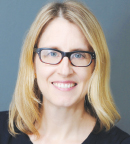Guest Editor’s Note: Healthful nutrition plays an important role throughout the cancer continuum. Given the proliferation of online dietary resources, there is a clear need for reliable information. In this article, Dr. Heather Greenlee describes the website Cook for Your Life, launched in collaboration with the Seattle Cancer Care Alliance, which offers science-based and easily understandable information for cancer clinicians and patients.

Heather Greenlee, ND, PhD
Food is an important, and often challenging, part of the cancer experience. During and after cancer treatment, patients can experience unpleasant side effects that reduce their appetite and ability to eat regularly. During survivorship, patients often receive conflicting information from family, friends, online sources, and clinicians. Add in competing pressures for time and energy, and it becomes more difficult to put healthful nutrition recommendations into regular, consistent practice. Although there are countless cooking resources available online, it is a challenge to find science-based, easily understandable information about healthy eating for people affected by cancer.
A Shared Mission of Nutrition and Health
In 2007, two-time cancer survivor Ann Ogden Gaffney founded Cook for Your Life as a nonprofit in New York City, offering free, in-person cooking classes to patients with cancer and survivors. In 2012, Ann’s classes became an extensive online resource (cookforyourlife.org), offering healthy recipes and nutrition tips to people touched by cancer all around the world. In 2017, the site began to offer its content in both Spanish and English. The site now enjoys an average of 200,000 to 250,000 users per month, with the majority of traffic originating in the United States, Europe, and South America.
In 2009, while on faculty at Columbia University’s Mailman School of Public Health, I began collaborating with Ann. This partnership has led to National Cancer Institute and foundation-funded trials to study how nutrition interventions can improve health outcomes among patients with cancer and survivors, with a focus on underserved communities. In 2017, I relocated to the Fred Hutchinson Cancer Research Center. When Ann announced her retirement, Fred Hutch acquired the website in 2019.
A New Look Backed by Science
In December 2020, we launched the newly redesigned Cook for Your Life website in partnership with the Seattle Cancer Care Alliance (SCCA), a consortium of Fred Hutch, the University of Washington, and Seattle Children’s. The new website offers an ever-expanding collection of recipes, videos, and science-based nutrition and health information in both English and Spanish—all reviewed by oncology-trained dietitians to ensure that all content is backed with scientific evidence from accredited institutions and current peer-reviewed scientific papers.
The website has a strong medical and scientific advisory board. In addition to using recommendations from the National Cancer Institute, the Academy of Nutrition and Dietetics, the American Institute for Cancer Research, and the American Cancer Society, our team closely collaborates with Medical Nutrition Therapy Services at SCCA to ensure that our website is useful for both clinicians and their patients.
Tailored to Specific Needs
Offering cancer-focused recipe categories, this resource makes it easier for patients and their caregivers to find recipes tailored to their specific needs. New categories address even more of the side effects and symptoms many people may experience during treatment, such as taste changes, mouth sores, constipation, and ileostomy management. There is also a wealth of recipes for cancer survivors that follow recommendations for nutrition and survivorship. These recipes focus on incorporating more plants into the diet by including an array of colorful vegetables, whole grains, and legumes—all foods known to support a cancer-protective diet.
GUEST EDITOR

Jun J. Mao, MD, MSCE
Integrative Oncology is guest edited by Jun J. Mao, MD, MSCE, Laurance S. Rockefeller Chair in Integrative Medicine and Chief of Integrative Medicine Service at Memorial Sloan Kettering Cancer Center, New York.
Users can now create customizable shopping lists from any recipe page, giving them the ability to organize their meals for the week, share the list with family and friends, or bring it with them to the store for a more efficient shopping trip. For many patients and survivors, especially during the COVID-19 pandemic, making a trip to the store may be unwise or, at times, impossible, so there is also an option for ordering groceries online and having them delivered directly to their doorstep.
Avenue for Research
Backed by research and clinical trials, we are using this global platform as a powerful tool to test and implement advances in nutrition, energy balance, cancer prevention, and survivorship. The new website enables scientists to collect and protect user data by Health Insurance Portability and Accountability Act (HIPAA)-compliant standards, which opens the door for new, remotely conducted studies of nutritional and behavioral interventions for cancer survivors. These new scalable virtual research trials open up more opportunities for reaching and including historically underrepresented populations.
Our team of culinary educators and research scientists are passionate about driving the science forward and ensuring that our platform is not only a cutting-edge research tool, but also an inclusive, multicultural resource that every patient, survivor, caregiver, and clinician can use.
DISCLOSURE: Dr. Greenlee reported no conflicts of interest.
Dr. Greenlee works in the Divisions of Public Health Sciences and Clinical Research at Fred Hutchinson Cancer Research Center; the Division of Medical Oncology and Department of Medicine, University of Washington School of Medicine; and the Integrative Medicine Program at the Seattle Cancer Care Alliance.

